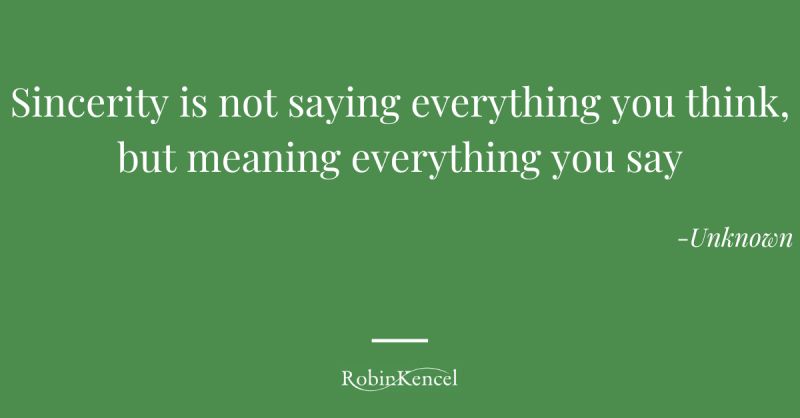Robin’s Thoughts
Sincerity

One of the first things you’re told in an improv class is: don’t try to be funny.
Which is ridiculous advice if you think about it. You signed up for improv, not jury duty. You’re there to be funny—or at least to survive the terror of pretending to be funny. But apparently, that’s not how it works.
When our teacher gives this note, I immediately relax, because I know for sure that I am not funny. Correction: I am funny to exactly one person in life—my husband. But his rose-colored glasses are so thick they tint everything pink. The whole world looks like it’s slightly bloodshot. See? Not funny.
And yet, here’s the mystery: improv scenes are funny. Genuinely funny. Unexpected, creative, smart. You end up delivering exactly what the teacher told you not to go for.
So what’s going on?
Here’s the secret: improv doesn’t start with trying to be funny. It starts with sincerity. You just have to show up and be honest. Honest about your reactions, your feelings, what you want from the person next to you. Be emotionally available. Be present. That’s it. How hard can that be?
I’m here to tell you, it’s harder than you would think.
This whole “start from sincerity” thing got me thinking: why is it that some people seem to live with their emotional windows open—real, grounded, unfiltered—while others feel like they’re peeking through the blinds?
I think it comes down to how comfortable you are with yourself. If you basically like who you are—if you can look at your good moments and your not-so-good ones with some level of honesty and grace—then sincerity comes naturally. But if you’re someone who’s still at war with yourself, or ignoring that tiny voice that occasionally whispers, “Maybe make a different choice next time,” then being sincere—on stage or off—can feel like trying to do yoga in too tight jeans.
All this has inspired me to launch a little Sincerity Challenge. For the next 30 days, I’m adding a new step to my nighttime prayers. Along with the usual “where did I see grace today,” I’ll do a quick sincerity review:
–Was I authentic in that exchange?
–Was I truthful—without being brutal?
–Did my real self show up, or was it my more polished, “please like me” version?
If this idea speaks to you, join me. Worst case, you end up knowing yourself a little better. Best case, you discover that sincerity—like good improv—isn’t about trying too hard. It’s about showing up as yourself. And sometimes, that’s the funniest thing of all.